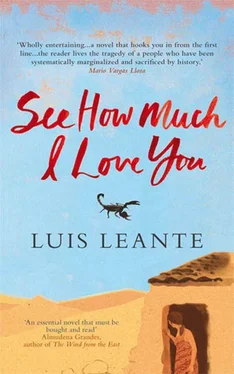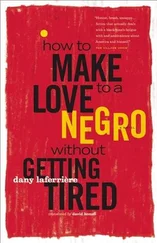The Saharawi poured himself some more coffee. He tried not to force a decision out of her; but he was honest when Montse asked:
‘What would you do in my place, Ayach?’
‘I’d go. If Allah wants you to find him, you’ll find him even if you stay here or hide in the last corner of the earth. And if He doesn’t…’
Montse took out her passport and got a pen and some paper.
‘So what do you need for the visa?’
A STRONG WIND IS BLOWING AT NOON WHICH TESTS THE strength of the jaimas . Sand comes in thorough the tiniest gaps. Montse is surprised at the transformation of the landscape. The dogs bark furiously, maddened by the wind. She has spent all morning in the kitchen, helping Layla’s aunt. When she goes out, she has to cover her face with a scarf and close her eyes. The sand gets into her clothes, her nose and ears. Although she keeps her mouth shut, Montse can feel sand on her palate and between her teeth.
After lunch, the jaima fills with the neighbours who come in to watch the soap. Montse doesn’t want to miss this. She sits behind the women and takes in every last one of their reactions. Layla sleeps amid all the noise, lying in a foetal position, with her face covered by the melfa . It’s an image of great beauty. Suddenly the wind stops and the silence outside captures Montse’s attention. Once again she can hear the bleating of the animals. She begins to feel a kind of numbness. Her legs go limp and her eyes are heavy. She seems to be hearing the voice of her daughter Teresa in the distance, as if she were in another room. Yet she knows it’s only her imagination. The memory, now, is not as painful as it used to be. Teresa would have liked to see this place. Hazily, Montse thinks of all the things her daughter didn’t get to see. The sound of the TV washes over her thoughts. Far away she hears someone whistling. It is a popular song. She cannot quite place it, but she’s heard it several times. The jingle is part of her adolescence. Without quite realising it she comes round from her reverie. The whistling is not in her head. It startles her. She really is hearing it. There’s someone whistling the tune in the street. She tries to place the music. It’s a pasodoble: she’s sure of that. When she recognises the chorus, her heart misses a beat. The women have not noticed the whistling. They are engrossed in the Algerian programme. Layla sleeps, oblivious to it all.
Montse stands up and goes out. No one takes notice of her. There are no people outside. There is no wind. And the whistling too has stopped. Specks of sandy dust are still floating in the air, like clouds or a dry fog. The sky is overcast, but the heat is dry and stifling. Montse cannot understand why she’s suddenly so nervous, so restless. She decides to take a walk. In the distance, on top of the low hill, she can see the school for handicapped children. Her steps take her in that direction. The first time she saw Bir Lehru it was from up there, and the view struck her as beautiful.
She walks with her eyes fixed on the ground and her feet. And so she doesn’t realise that nearby there is a man crouching down, with his back turned to her. When she finally sees him she stops. Should she approach him or continue on her way? Perhaps the man is praying. Suddenly he stands up and Montse is startled. He holds his derraha , lifted up to his waist, in one hand. The Saharawi has not seen her. The white skin of his buttocks contrasts with the dark skin of others of his race. Montse is embarrassed at the idea of his finding her there, looking at him. But by the time she decides to turn around it is too late: the man has seen her and is walking towards her. He stops about five metres from her.
‘ Musso mussano? Musso mussano ?’
She recognises him and calms down. It’s The Demon. He doesn’t look so old now. His skin is sunburnt and his lips are covered in blisters.
‘ Les bes, Le bes ,’ replies Montse. ‘I’m fine.’
On hearing her, the Saharawi opens his eyes wide. His derraha is all twisted, like a nightgown.
‘You Spanish?’ he asks in a strong Saharawi accent.
‘Yes, I am.’
‘I got many friends. Many Spanish.’
Now that she sees him from up-close, he looks harmless. Were it not for the expression in his eyes, she wouldn’t have doubted the man’s sanity. He says something in Hassaniya. He seems to be reciting verse. Montse interrupts him to ask him his name.
‘Can’t remember. I forget things. Spanish, beautiful ladies.’
Montse smiles. She doesn’t want to offend the man by turning her back on him. The Saharawi clumsily lifts his derraha . Montse thinks he wants to flash at her. But she’s wrong. He’s looking for something in his pocket, and on finding it approaches her. He offers Montse a stone. At that moment she realises the man’s missing an arm. His stump peeks out of a derraha , cut off almost at the elbow. She tries not to stare, and looks at the stone instead. It’s very beautiful. A rose of the desert.
‘For Spanish woman,’ the man says.
‘ Shu-cran ,’ thanks Montse. ‘It’s quite pretty.’
‘Spanish women pretty.’
The Saharawi’s eyes fix on something. Montse realises he’s not looking at her. His mind is elsewhere. For a moment she feels awkward. She holds the rose of the desert in both her hands.
‘It’s very beautiful,’ she says. Her voice sounds forced.
The Saharawi turns around and walks off without saying a word. She looks at him, finding it impossible to calculate his age. It must be very difficult for a mentally ill person to survive in such a hostile environment. She cannot get the image of the stump off her mind. Montse looks at the present the stranger has left her. She walks on towards the school.
And then, as if she were still dreaming, she hears the whistling again, though now loud and clear. She looks around but does not see anyone. In spite of the heat, her whole body shivers. The old singsong, clumsily whistled, takes her back to an August night many years ago: a square full of people, a band playing on a metal stage, and a pair of dark, beautiful eyes that won’t stop looking at her. The most beautiful eyes of all.
Brief background to the Conflict in Western Sahara and information about Sandblast
WESTERN SAHARA IS AFRICA’S LAST REMAINING COLONY. Since 1975, it has been the site of a little known conflict for territorial control between Morocco and the Polisario Front, the Saharawi independence movement. The disputed territory is wedged between Morocco to the north, Mauritania to the south and Algeria to the east. Roughly the size of Britain, it enjoys a coastline over 1000 km long and is legendary for its rich fishing waters. For many centuries, this coastal desert patch was home to the Saharawis, a nomadic and tribal people.
The closest Canary Island lies only 80 km away from Western Saharan shores. This strategically important archipelago provided the pretext for Spain’s colonial interests in the region, at the end of the 19th century. The colony later became incorporated into Spain as its 53rd province, in 1958, after abundant phosphate deposits were discovered near the capital of Al-Aauin. But by then, anti-colonial winds had begun to blow strongly across the continent. With the rise of the armed Polisario movement, in 1973, Spain felt the pressure to decolonize. However, when it finally withdrew two years later, the Saharawis faced a double invasion rather than the freedom they had expected to achieve through a promised referendum vote.
Politically weakened by Franco’s imminent death, the metropolis had opted for a rapid withdrawal from its colony. It signed a secret but illegal accord to hand administrative control over to Morocco and Mauritania, who also claimed Western Sahara as theirs. In return for thirty-five per cent rights to the phosphate deposits, Spain had gone against the Saharawi will and the Advisory Opinion of the International Court of Justice, which on October 16th 1975 had firmly rejected the above sovereignty claims. Determined to be a free people, the Polisario forces resisted. This sparked a war that carried on with Morocco for sixteen years, but led to Mauritania’s defeat and withdrawal in 1979.
Читать дальше




![Ally Carter - [Gallagher Girls 01] I'd Tell You I Love You But Then I'd Have to Kill You](/books/262179/ally-carter-gallagher-girls-01-i-d-tell-you-i-lo-thumb.webp)







